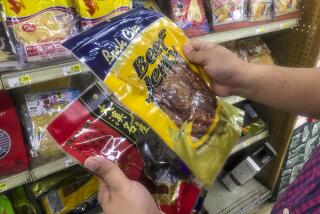Shark Jerky, Salt Junk or Pasta Primavera?
- Share via
Our present-day military has put a lot of effort into making MREs palatable, and hikers can choose from a wide range of backpackable meals. Throughout history, though, soldiers on campaign, sailors and all travelers in remote areas have carried much simpler snacks that have been called iron rations: foods that keep indefinitely and require minimal preparation.
Usually this meant dried meat and ready-to-eat grain products, such as hard biscuits (hardtack) or parched (that is, toasted) grain, which needs only the addition of water to make a sort of porridge. In some areas, dried fish would substitute for jerky--in southern Arabia, it’s dried shark (lakhm); in Siberia, a sort of flour of ground dried fish (yukola).
All these foods were suitable from the standpoint of keeping body and soul together, but they could be stale, rancid or infested by insects by the time you needed to eat them. So they tended to acquire sardonic nicknames. Civil War soldiers referred to hardtack as “death bells”; sailors called salt meat “salt junk,” meaning salted rope (“junk” was originally a term for scraps of worn-out rope, which could be put to various uses aboard ship).
But they all had a serious nutritional drawback for long-term use--they were short on vitamins and posed the danger of scurvy. To fight this, soldiers during the Civil War were issued dried vegetables that could be reconstituted in water. Needless to say, in soldier talk “desiccated vegetables” became “desecrated vegetables.”
One exception to the rule was pemmican, a Native American iron ration consisting of meat pounded with fat and often dried berries. In its way, it was a bit like the modern backpacker’s “gorp.” But even from there, it’s a long way to energy bars and freeze-dried angel hair primavera.


